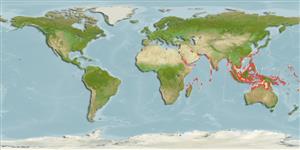Elasmobranchii (sharks and rays) >
Carcharhiniformes (Ground sharks) >
Carcharhinidae (Requiem sharks)
Etymology: Rhizoprionodon: rhiza (Gr.), root; prion (Gr.) saw; odon (Gr.), tooth, referring to teeth with serrated (saw-like) bases, or roots [replacement name for Rhizoprion Ogilby 1915, preoccupied by Rhizoprion Jourdan 1861 in mammals] (See ETYFish); oligolinx: Per Springer, Greek for “short furrow,” referring to short upper labial furrow (See ETYFish).
Environment: milieu / climate zone / depth range / distribution range
Ecology
Marine; reef-associated; depth range 0 - 36 m (Ref. 9997). Tropical; 30°N - 18°S
Indo-West Pacific: Persian Gulf east to Thailand, Indonesia, China, and Japan. Recorded from the Gulf of Carpentaria (Ref. 6871) and Palau (Ref. 244). This species is very close to Rhizoprionodon taylori, but is geographically separated from it (Ref. 244).
Length at first maturity / Size / Weight / Age
Maturity: Lm 43.2, range 32 - 65 cm
Max length : 84.5 cm TL male/unsexed; (Ref. 121648); 77.5 cm TL (female); max. published weight: 2.8 kg (Ref. 121648)
Dorsal spines (total): 0; Anal spines: 0. Position of anal fin origin well in front of second dorsal fin origin, long labial furrows, and short pectoral fins (Ref. 37816).
A little known inshore and offshore shark found on continental and insular shelves (Ref. 244). Found to depths of at least 36 m (Ref. 9997). Probably feeds on fishes, cephalopods, and crustaceans (Ref. 6871). Viviparous (Ref. 50449). Commonly caught by inshore demersal gillnet fisheries, especially off Java (Ref.58048). Utilized fresh and probably dried salted for human consumption (Ref. 244). Also used for fishmeal (Ref. 9997) and fins (Ref.58048). Minimum depth from Ref. 58018.
Viviparous, placental (Ref. 50449). With 3 to 5 young per litter (Ref. 244, 37816). Size at birth 20-30 cm TL (Ref. 9997, 37816). Distinct pairing with embrace (Ref. 205).
Compagno, L.J.V., 1984. FAO Species Catalogue. Vol. 4. Sharks of the world. An annotated and illustrated catalogue of shark species known to date. Part 2 - Carcharhiniformes. FAO Fish. Synop. 125(4/2):251-655. Rome: FAO. (Ref. 244)
IUCN Red List Status (Ref. 130435: Version 2024-1)
Threat to humans
Harmless
Human uses
Fisheries: commercial
Tools
Special reports
Download XML
Internet sources
Estimates based on models
Preferred temperature (Ref.
123201): 26.2 - 29.3, mean 28.6 °C (based on 2593 cells).
Phylogenetic diversity index (Ref.
82804): PD
50 = 0.5078 [Uniqueness, from 0.5 = low to 2.0 = high].
Bayesian length-weight: a=0.00339 (0.00271 - 0.00424), b=3.07 (3.03 - 3.11), in cm total length, based on LWR estimates for this species (Ref.
93245).
Trophic level (Ref.
69278): 4.1 ±0.55 se; based on food items.
Generation time: 2.3 ( na - na) years. Estimated as median ln(3)/K based on 1
growth studies.
Resilience (Ref.
120179): Very Low, minimum population doubling time more than 14 years (Fec=2).
Fishing Vulnerability (Ref.
59153): Moderate vulnerability (45 of 100).
